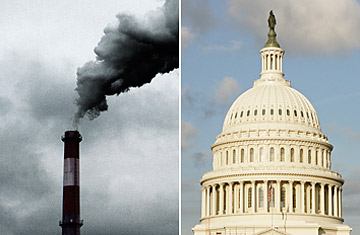
Forging congressional legislation to effectively tackle climate change was never going to be easy — but it just became a lot harder. Republican Senator Lindsey Graham, who had been working on a climate and energy bill with Democrat John Kerry and independent Joe Lieberman, announced on Saturday that he would suspend his involvement in the negotiations, blaming what he termed the Democrats' "cynical ploy" in focusing on immigration reform first. "Unless their plan substantially changes this weekend, I will be unable to move forward on energy-independence legislation at this time," wrote Graham in a letter to business, environment and military leaders. "I will not allow our hard work to be rolled out in a manner that has no chance of success."
Graham's change of heart scuttled a planned announcement of the bill on Monday, when the three Senators had been set to share the stage with executives from energy and oil companies to introduce their legislation. Kerry and Lieberman said they would continue working toward the legislation, and White House climate czar Carol Browner said in a statement that the Administration would support "both comprehensive energy independence and immigration-reform legislation." But losing Graham — one of the few Republicans in Congress who still seems to believe in tackling global warming through curbing carbon emissions — is a body blow for climate and energy legislation, which was already facing a vertical battle in Congress.
Graham, Kerry and Lieberman had been working on the bill in the Senate for nearly half a year. (Another climate bill, sponsored by Democratic Representatives Henry Waxman and Edward Markey, passed in the House nearly a year ago.) The Senate bill was always going to be controversial. While the House legislation was built around capping and trading carbon emissions, Graham had declared that principle "dead," and so the Senate bill was going to focus more narrowly on the electricity sector, rather than on the entire economy. That may have allowed Kerry, Graham and Lieberman to enlist serious industry support for their bill, including the trade group for private electrical utilities and many of the major oil companies. Not coincidentally, a number of more liberal environmental groups, like Friends of the Earth, were already pronouncing the prospective Senate bill far too weak to deal with climate change.
That might be a moot point now. Late last week, partially in response to the passage of a law in Arizona that gives police there unprecedented latitude to crack down on illegal immigration, the Democratic leadership began considering moving immigration reform ahead of climate and energy legislation in their congressional priorities. Given how split the country remains on immigration and the fact that little advance work on the issue has been done in Congress, Graham told reporters on April 22 that moving ahead on the issue "destroys the ability to do something like energy and climate."
Though the White House said it was committed to moving forward on both fronts, Democratic Senators Harry Reid and Barbara Boxer are both facing tough re-election contests, and energizing Hispanic voters by moving on immigration reform — even if it has little chance of becoming law — could help save their seats in November. But by Monday, Graham, who is also one of the few Republicans who might cooperate with Democrats on immigration reform, apparently had had enough.
Still, the timing of immigration reform may not be the only reason Graham is retreating from climate and energy legislation. The South Carolina Republican has come under intense criticism from his own party over his participation in the legislation, which has become increasingly unpopular with conservatives — a March Gallup poll found that the percentage of conservatives who believe climate change is real and occurring dipped from 50% in 2008 to 30% this year, while liberals and moderates showed little change.
Standing up for a climate and energy bill even as industry-friendly as the prospective Senate legislation had become was a lonely place for Graham. "There has been enormous back-pressure against the kind of bipartisan cooperation Senator Graham has engaged in," said White House economic adviser Lawrence Summers on Face the Nation. "That perhaps has made this a more complex situation, more difficult for him than it would otherwise be." Like Florida Governor Charlie Crist, who is struggling in his Republican-primary race for a Senate seat, Graham is part of an increasingly endangered species: moderate Republicans.
But Graham may not have been the only one having second thoughts — climate and energy legislation never seemed to have the full-throated backing of the White House or Democratic leadership. The political upside seemed limited at best, with opponents of the legislation successfully characterizing cap and trade as an energy-inflationary economy killer. (The fact that independent analysts at the Congressional Budget Office reported that the climate bills would actually reduce the budget deficit over time seemed to make little difference.) Even before Graham's decision, it was proving difficult to earn the support of conservative Democrats representing industrial and agricultural states in the South and Midwest. Bipartisan support now seems nearly impossible, especially if Graham is gone for good.
Mainstream environmentalists are trying to stay hopeful in the wake of Graham's retreat. "This is a disappointment, not a defeat," says David Hawkins, head of the Natural Resource Defense Council's climate center. And thousands of supporters rallied on the National Mall on Sunday to call for a climate bill. "Our Congress still isn't acting," says Dennis Hayes, who helped organize the first Earth Day more than 40 years ago. "We're here to demand action." With time running out for this Congress — and with Democrats almost surely set to lose seats after the November midterms — a climate bill that isn't enacted now could be lost forever.
